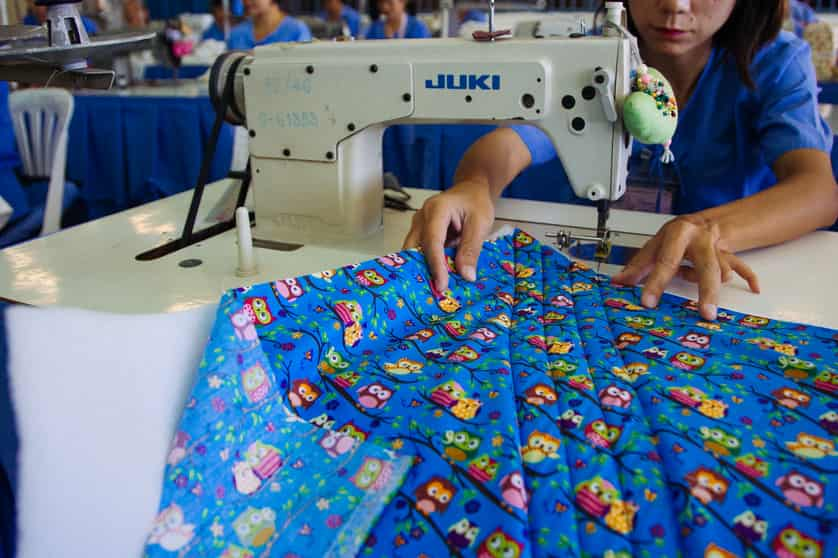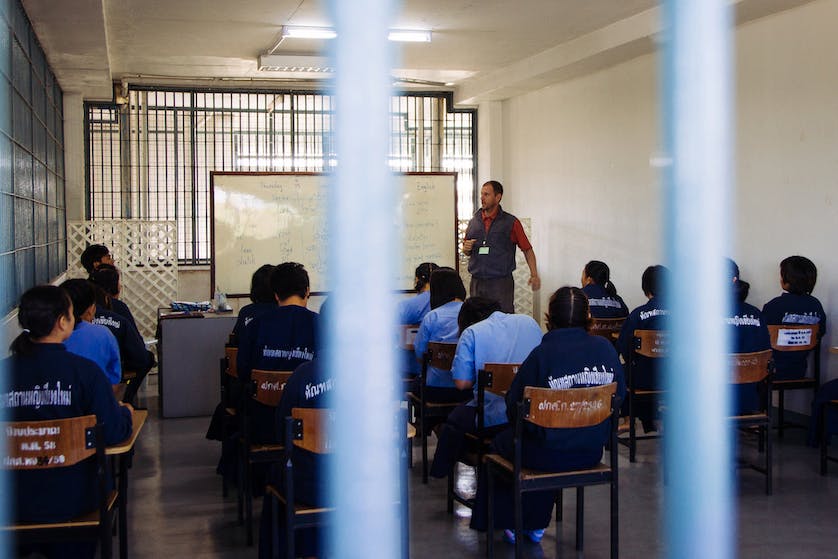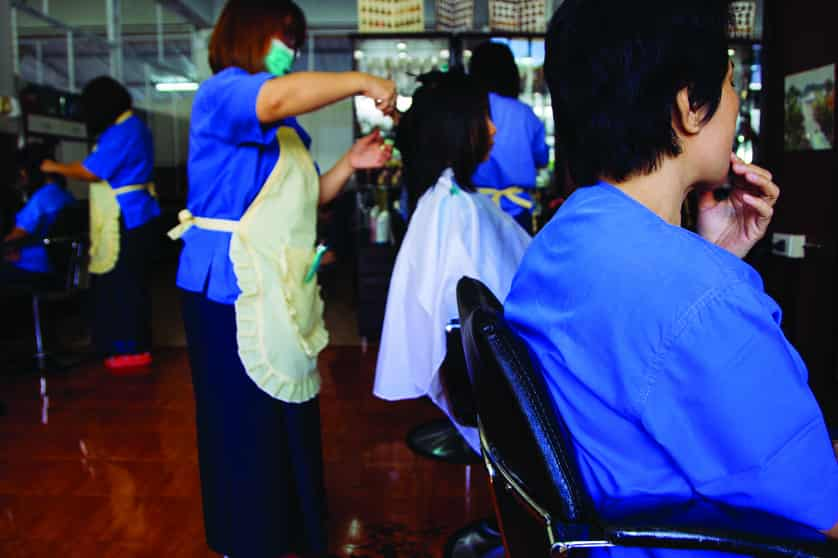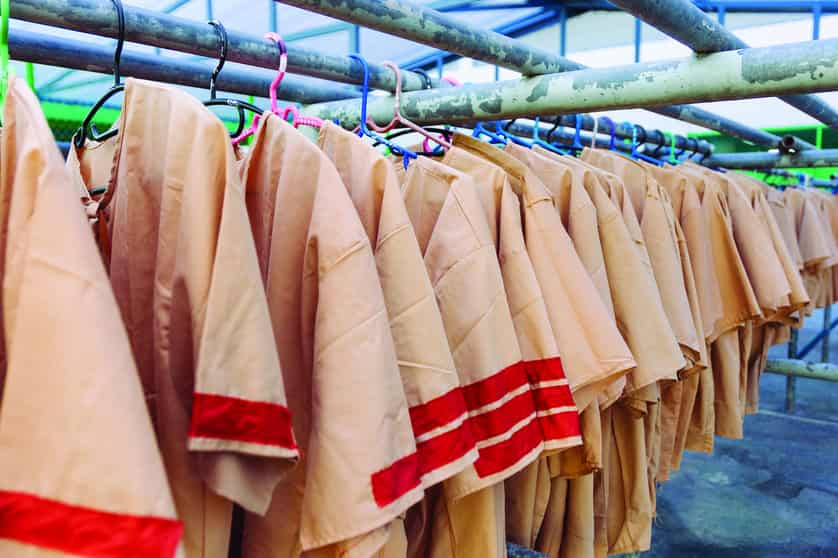In late January, a scoop of journalists were invited to join Her Royal Highness Princess Bajrakitiyabha in her capacity as the United Nation’s Office of Drugs and Crime’s (UNODC) Goodwill Ambassador, on her visit to the Chiang Mai Women’s Correctional Institution. We were there because Chiang Mai prison is one of ten prisons in Thailand piloting the ‘Bangkok Rules’, or guidelines for the treatment of female prisoners adopted by the United Nations’ General Assembly in 2010.
Citylife had last visited the women’s prison over a decade ago at its old city location and was impressed by the efforts by then-director Nawarat Tanasrisutarat who, through her own initiative, was spear-heading reform by offering a plethora of vocational training as well as opportunities for prisoners to save money by working pre-release. While our visit showed us an institution with numerous progressive agendas being implemented, there was an obvious lack of space, and eventually the overcrowding was so critical the old location was abandoned and inmates moved to its current location opposite the Provincial Hall in 2013. Since then we have been sending periodical letters requesting access, to no avail.
“I hope to promote the understanding that the rule of law in the region is not only about prosecuting and punishing offenders.” HRH
So it was with a frisson of anticipation that we followed the princess’s entourage, representatives from the UNODC, prison officials and diplomats into the short tunnel through the building which acts as a wall surrounding most of the prison. Thickly-barred gates clanged loudly as we entered, steel spikes baring their fangs in intimidation. But once we emerged into the sunny courtyard, it was the vibrant kaleidoscope of colours that assaulted the eyes — potted plants and flower beds lined cobalt blue fenced walkways, gurgling fountains featured gaudy miniatures of flamingos and turtles, chirpy hand-painted signs pointed cheerfully to innocuous sounding destinations such as the nursery, happy centre or canteen and bushels of fake flowers in pots of plastic bottles were wired onto mesh fences. We were led up stairs, down freshly painted corridors, steel-barred rooms containing women in freshly-pressed uniforms taking classes, with volunteer teachers giving lessons in music, English or school syllabuses and religious leaders each having a room for Muslim, Buddhist and Christian teachings.
We arrived at a conference room which had been turned into an exhibition centre featuring displays of the steps required to implement the Bangkok Rules, where the princess said a few words.
“I hope to promote the understanding that the rule of law in the region is not only about prosecuting and punishing offenders. Rules of law matter because they have a profound impact on lives and some say that the system has failed them and their needs. We have to ensure fair and equitable justice and understand the reasons people are ending up in prison. We also have to address the specific needs of women in prison like those we are meeting here today. They have incredible potential to contribute to society and communities, and we need to support them to do so,” said HRH.
Crunching Numbers
As of the beginning of this year the Thai prison population is 325,298 with 13%, or 43,426 being women, the fourth largest number of female inmates in the world following the United States, China and Russia, according to the International Federation for Human Rights. The reason for such high numbers is drugs, which accounts for 82% of all female incarcerations, with sentences ranging from a couple of years to the death penalty (for men, the number is 61%). International standards also recommend minimum space specifications per prisoners at 3.40 sq. m. per person for shared cells. Thailand’s Department of Corrections has set the standards for sleeping at 2.25 sq. m. but the reality is that some prisons in Thailand allocate a mere .60 sq. m. per person. Chiang Mai’s women’s prison, in spite of only being at 50% capacity, sleeps sometimes up to 50 inmates in a cell, reducing their personal space to around 1.70 sq. m. The explanation is that while there are numerous available dormitories, lack of staff to supervise has led to overcrowded cells. International standards suggest a ratio of one staff to three prisoners, while Chiang Mai Women’s Correctional is currently at one to twenty five and since 70% of them work in office buildings in administration and finance, the actual custodial staff is very limited. The prison, northern Thailand’s only women’s prison, is currently at only 50% capacity, but the number of women prisoners have more than doubled in a mere decade, and with current drug laws, only set to rise further.
Royal Reform
In 2001 HRH Princess Bajrakitiyabha visited Bangkok’s Central Women Correctional Institution and was distressed to have witnessed such low standards. By 2006 she had initiated the Inspire Project with the aim of improving the quality of lives of women inmates throughout Thailand, focusing on offering assistance to pregnant inmates and their children as well as rehabilitation programmes in preparation for release and reintegration into society. At the same time HRH was serving as First Secretary at the Permanent Mission of Thailand to the UN when she learnt that there was only a Standard of Minimum Rules for the Treatment of Women, adopted by the UN in 1957 which hadn’t been updated since. Due to her continued leadership in this matter, in 2010 the UN adopted the Rules for the Treatment of Women Prisoners and Non-custodial Measures for Women Offenders, calling it Bangkok Rules, in HRH’s honour (in 2015 the UN adopted the Mandela Rules, a similar set of standards which applies to all prison population). Today Chiang Mai Women’s Correctional Institution is one of ten model prisons in Thailand chosen to apply the Bangkok Rules standards.
“Prisons were never designed for women and their specific needs,” said Jeremy Douglas, Regional Representative of the UNODC for Southeast Asia and Pacific. “It took HRH’s focus on the Inspire Project to get Thailand to step up and take a leadership role on the global stage, and the effects are being seen in these model prisons here in Thailand. Needs of women, from physical, mental, health and child care and other gender sensitive issues, needed to be directly addressed. The Bangkok Rules apply to day to day operations, welfare and rehabilitation programmes, skill enhancement activities and training.”
The Tour
The next few hours were spent touring the facilities. Buildings with open-air corridors faced the central courtyard where groups of inmates on yoga mats were doing their morning exercises. Cells large and small, many featuring freshly-painted signs proclaiming them to be activities, study, or meditation rooms held groups of well-groomed and orderly inmates rapt in study, surrounding bars adorned with inspirational and educational posters — interestingly in both Thai and English. There was a weaving room with dozens of women working on large traditional wooden looms, a cell next door an obvious pop-up showroom featuring exquisite silk and cotton textiles our custodial tour guide explained were sold and profits shared with inmates.

“We encourage our inmates to find a vocation or skill so that they can start earning money while they are in here,” explained our guard guide, Manuswee Boonak. “The general rule is that inmates receive 50% of net profits, 15% are shared between the officials and 35% goes to the prison for overheads. Some of our inmates, especially the ones who get to go and massage outside the prison, can make up to 15,000 baht a month,” she explained proudly.
A massage room, complete with massage tables and chairs, had inmates practicing on one another, the lucky few who had both good skills and record of behaviour, and only those with under three and a half years left in their sentence, eventually allowed to take the daily trips to the old city to work in the Women’s Massage Centre, a social enterprise belonging to the prison. A computer room had every seat filled, inmates’ eyes glued to their screens, donated by generous organisations and businesses, we were told. We were allowed to see a few cells which were bare-floored and spotless, beddings rolled up and kept in a corner, with a barely discreet and open-aired two foot high wall at its end giving a modicum of privacy for those needing one of the two toilets per cell. A large area housed the elderly, busy painting, weaving, reading and doing non-taxing tasks by day, before returning to their separate ground floor cells by night. A collection of rooms offered various resources such as a library and a law and consultation room. We were not given access to the top floor where most of the inmates sleep and where, by the look of the sparse number of inmates spread about in activity, most of the prisoners were currently being kept out of sight.

The tour continued downstairs and we walked past a fenced-in sports court which appeared to be for volleyball and basketball, a couple of incongruous and spanking new lending libraries containing ten or so books, set up on temporary shelves by the court’s entrance. Citylife’s photographer, who used to visit the prison twice a week as a volunteer music teacher, told us that while some of the signs, room setups and gardens were obviously new for the royal visit, much of the facilities and services seen were in fact operational. He did note that the prison, while always well maintained, did appear to be cleaner and more organised than usual.
A barber’s pole beckoned us to the beauty salon where inmates and guards can get a wash and dry for 30 baht.
“We get about 50 customers a day,” beamed Manuswee. “Our inmates are allowed to save up to 9,000 baht in the Department of Corrections accounts, but after that they must transfer it to family or friends, though we do make exceptions for those with no family. With this money they can spend up to 300 baht a day in our shops.”

Spotting rows of uniforms drying in a hanger, some sleeves featuring stripes, we asked what they meant and learnt, soberly, that one stripe indicated a sentence of over 30 years, two meant life and three meant death penalty. There were currently five women going through the process of appeal for their death penalties.
Our tour continued and soon we were crooning over babies in the nursery which currently cares for 11 babies born in the prison or to mothers newly incarcerated. As this was the main impetus for HRH’s passion for prison reform, the room was purpose-built and appeared to conform to all the health and safety regulations expected with smiling mothers, gurgling babies and even guards played on brightly coloured kid-friendly mats. Babies are kept with their mothers for one year, separated from the main body of prisoners and housed in relative comfort, after which they must either go to live with relatives or into government care. Families are able to bring children in for regular visits, though if they are in an orphanage they will only be brought for quarterly visits.
Health and Wellbeing
“We are very lucky to have such incredible support from the community with donations of not just time and money, but also goods,” said Bussaba Sakrangkul, director of the prison. “You saw our dental room, where four dentist chairs were donated and dentists come once a year for a period of 2-3 weeks to care for oral hygiene. We also have therapists and councillors to help with the mental wellbeing of our women.”
“Following the implementation of the Bangkok Rules, everything changed,” explained Bussaba of the 70 rules, adopted by the United Nations as a standard of good practice for female prison officers and how they interact with women prisoners. “It starts from the moment they arrive. Whereas in the past we used to perform invasive cavity searches, today we no longer do that, instead using scans. It is all about respecting the dignity of these women, and we have yet to find any drugs on premises, as most of the women were dealers and not users. Those who arrive with addiction are immediately put into an intensive six month rehabilitation programme and our biggest focus is on mental health. Since 80% of our inmates are mothers, there is a lot of separation anxiety. New arrivals are separated from the main body of prisoners for one month in order to acclimatise.”

“I only have good things to say about my time there,” Oy.
We are shown to the arrivals processing area where women were sitting on the floor avoiding eye contact. A computer room next door offered live video calls to lawyers and families and a counselling room had signs offering mental health resources.
“We even have a menopause clinic,” added Bussaba, “these are all things we never had before.”
As our group wended our way back to the entrance, a Lanna market was set up and as the Princess got herself a neck massage, the US Consulate General grabbed a cupcake offered up by an inmate and we mingled with guards and selected inmates, we were introduced to Oy an ex inmate who now owns a flower shop in the city.
“When I left here I had no one and had lost all my possessions,” said Oy who went on to say that she learnt her computer and accounting skills during her four years in Chiang Mai Women’s Prison. She now owns a flower shop and is soon to start teaching floral arrangements to retirees. “I only have good things to say about my time there,” she insisted, when we caught up with her a few weeks later. “There were the usual problems with people you have anywhere. There were bad inmates and bad guards, but it wasn’t systematic. I learnt many skills while I was in there which has equipped me for life. I never saw any drugs or deliberate violence, sure there were the usual fights and there was always a lack of resources, but in spite of all that I got to learn and train and I now have skills I never had in life before.”
Pretty Picture
Not everyone agrees with the rosy picture presented. Na, who was wrongly incarcerated for 10 months for illegal logging before being found innocent had a less positive experience. “The food was really bad, and I got piles because the rice was so hard,” she said. “Our shower time was so limited we only had time for three quick buckets of rusty water a day and there was also a lot of bad behaviour by some of the guards. They say you are going to get money, but then you are punished for various offences and the money is docked without reason. If you didn’t have outside family bringing you medicine, sanitary products and food, then you were in trouble, unless you played favourite with a guard. I don’t think that this was a policy, and I don’t even think that the bosses really knew, but low-level guard corruption is rife. Many also treated us like animals.”
Na, however, left the prison a year before the implementation of the Bangkok Rules, so wasn’t able to comment on the situation today. She now works as a masseuse, a popular vocation for many released inmates.
“I saw that we were a tourism city and that ex inmates would have a better chance at working in the tourism industry,” said Nawarat, the ex-director previously interviewed by Citylife who retired in 2011. “We didn’t know how people would respond, and it took a while to build up trust, but now the massage centre is thriving.” Nawarat has gone from prison director to tycoon, having opened up her own business, Lila Thai Massage, after her retirement, a business which now has six branches across Chiang Mai, hiring 200 ex inmates and their family members. “I offer them a future and it pleases me very much when they tell me that they now can earn 120 baht an hour massaging tourists, saving up to buy houses and cars.”

Long Road Ahead
The Bangkok Rules were implemented in Chiang Mai two years ago, according to Director Bussaba. “It is all about human rights, and that is something we have to work hard to adjust all of our attitudes. I came into this position from a social worker background, so I always had empathy for inmates, but we have to work hard to train the guards to understand this shift in thinking.”
“The concern here is that many people are still seeing this as a pilot project,” said UNODC’s Jeremy Douglas. “The attitude of the guards is going to follow leadership and the long held approach has always been punitive and hard. It will take a long and continuous signal from the top to change attitudes throughout the system. Chiang Mai is in significantly better shape than other prisons in Thailand in terms of facilities and training,” but whether this is a short term effort due to the current spotlight, or the beginning of real reform, the verdict is still out.
What is important is a reminder that 80% of these women are incarcerated for drug offences. “The sustainable campaign against drugs is what is causing overcrowded situations and poor conditions in Thailand’s prisons. The government has been reviewing drug laws and policies, but due to ministerial changes the process has been slow. We expect the review process to be complete midyear perhaps leading to lower threshold sentences for minor offenses, even diverting people to treatment or community services.”
Nawarat agrees that the law and attitudes have a long way to go to affect change, “just last year a new law came out to apparently protect the safety of tourists saying that newly released inmates were barred from working in massage or spas for one year and barred from owning a business for five years after release. I can’t imagine why they would come up with such a law. What are these women with skills supposed to do to eat for a whole year while they wait to earn a living?”





